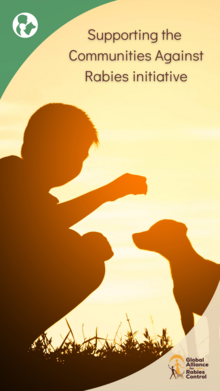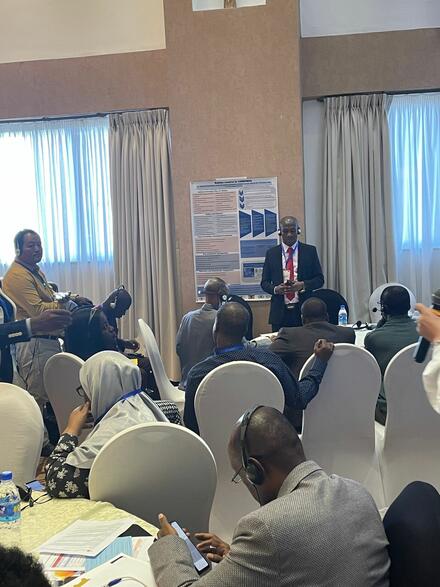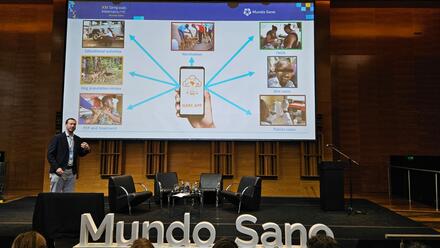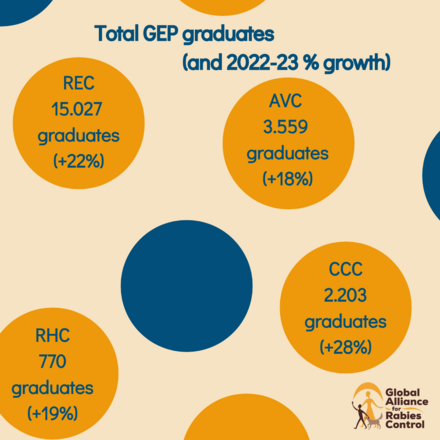Year in Review 2023
In 2022, we took the decision to add a specific focus on the promotion and support of small-to-medium community-based rabies initiatives and organizations to our mission. Many of these players have increasingly drawn our attention when tracking needs and activities in our Regional Networks and around World Rabies Day (WRD) events. We were enabled to explore this important course as the UAR Forum could take over what had been the traditional role of the Partners for Rabies Prevention (PRP) as outlined in the meeting report. Thus, we endeavored to develop and implement a strategic change to our global approach for the support of rabies control and elimination on a community level through the new Communities Against Rabies initiative (CAR).
The CAR initiative also allowed us to modify, add to and update the Rabies Epidemiological Bulletin (REB) suite of tools. As always, it was also our mission this year to keep the Rabies Control Networks active through dedicated regional activities. We were particularly pleased that this year was the most successful WRD to date – and this is reported in more detail by our WRD team in an accompanying article.
I would like to use the opportunity to give a brief summary of our main activities during 2023 as follows:
Communities Against Rabies (CAR)

We were pleased to be able to make significant progress with this new initiative. In this regard we were most thankful to be able to partner with Battersea towards the development of the CAR initiative and to proceed with its implementation together with our campaign partners, viz. Sanofi, Boehringer Ingelheim and Battersea. The CAR initiative was officially launched at the end of August, and we also used the opportunity to renew and revitalize our End Rabies Now (ERN) campaign. As part of this process the GARC website underwent many updates, including an overhaul of the “Resources” section, significant improvements to the “Tools” section, and the new Communities Against Rabies page. Since the launch of CAR more than 650 Bronze Dog Health Champions and 4 Rabies Centers of Excellence have been recognized to date in the three countries identified for the initial launch, namely, Sri Lanka, South Africa and Nepal.
Rabies Epidemiological Bulletin: Surveillance tools suite
The REB is continually updated and expanded based on feedback and experience gained through its implementation around the world. Indeed in 2023 some of the REB tools were, on request, translated into Spanish, Portuguese, Hindi and kiSwahili. In addition, we developed and added the new Education Initiative Tracker (EIT) tool and updated many of our surveillance tools on the REB, including the Vaccination and Sterilization Tracker (VST) and the Rabies Case Surveillance (RCS) tools. These aspects are specifically elaborated in an accompanying article.
Regional Rabies Control Networks and associated activities
Africa and the Pan African Rabies Control Network PARACON

Prof Louis Nel was invited to prepare and present the World Organisation for Animal Health (WOAH) Regional Commission for Africa that adopted “Elimination of dog-mediated human rabies from Africa by 2030 - national strategies, legal frameworks, tools to track progress” as a Technical Item during the 25th Conference of the Regional Commission held in Gaborone, Botswana during February 2023. This document was drafted with the assistance of Dr Andre Coetzer and extensive input from numerous WOAH experts and can be found here, together with the specific resolutions that were subsequently adopted by the Conference.
In March 2023 we were able to once again host a PARACON workshop which was themed “Supporting rabies elimination in Africa through One Health stepwise approach” as a joint initiative between the FAO and GARC. In addition, we were delighted to participate in the 2nd Meeting of the Eastern Africa Sub-Regional Network for Rabies in Ethiopia.
The Collaboration between GARC and the Government of Zanzibar continues to progress and we have made good progress with the vaccination campaigns and implementation of the new Rapid In-Field Diagnosis and Epidemiology of Rabies (RAIDER) protocol. We also conducted a specific study on the utility of the use of dog collars during vaccination campaigns and this research yielded very interesting results that was recently published and is further elaborated on in an accompanying article in this newsletter.
Elsewhere GARC continued to support countries with the Stepwise Approach towards Rabies Elimination (SARE) and we conducted SARE workshops in Tunisia, Ethiopia and Niger. The outputs from these assessments should greatly benefit these countries to fine-tune and optimize their rabies control and elimination strategies. GARC, together with Action for the Protection of Animals (APAA) also engaged with the Government of Mauritius. We visited the diagnostic facilities and will be assisting Mauritius towards self-declaration of rabies freedom. At the same time, we will continue to collaborate to find solutions for the humane management of their dog population – which in recent years became increasingly problematic.
Middle East, North Africa and Eastern Europe Rabies Control Network (MERACON)
The European Union Technical Assistance and Information Exchange (TAIEX) arranged a rabies elimination workshop for North African countries at which Dr Terence Scott, the MERACON lead for GARC, presented and contributed towards the continued development and implementation of the target countries’ mass dog vaccination efforts, tying in activities with the aims of the MERACON and building better contacts for future engagement.
SE Asia and the Asian Rabies Control Network (ARACON)
In a collaboration between Boehringer Ingelheim and GARC, we developed a White Paper for SE Asia on rabies. The White Paper itself was launched at the Federation of Asian Veterinary Associations congress in Malaysia. Elsewhere GARC engaged with the Vietnamese Government and the NGO Soi Dog Vietnam regarding rabies control and the challenges that the dog and cat meat trade poses to rabies elimination efforts, while we also participated in a National Bridging workshop for rabies in Bali, Indonesia.
Americas and elsewhere

Following from our renewed engagement and collaborations with Biogenesis Bago and PAHO in 2022, GARC continued to build further collaborations and capacity to support the last mile efforts to achieving dog rabies elimination in the Americas, specifically in Latin America. Most notably, GARC was invited to participate at the 21st International Symposium hosted by Mundo Sano in Buenos Aires, Argentina and supported by Biogenesis Bago. This provided a major steppingstone for this future 3-way collaboration to deliver joint programmatic activities focusing on One Health through rabies elimination efforts in those last at-risk communities in Latin America.
Global
As we zoom out from Latin America and look at the activities that will span the globe, GARC is excited to announce a new program – supported by Bavarian Nordic – that will be launching in 2024. Stay tuned for more details about this exciting initiative.
In other activities GARC contributed to the development of “The case for investing in animal health to support One Health”, which is a scientific report of the Action for Animal Health network. Furthermore, GARC was invited to become a member of the PREZODE (Prevention of Zoonotic Diseases) global network and has just this week been officially voted in as a member.
GEP and other resources and materials

The GARC Education Platform (GEP) courses continue to grow at a steady rate with more and more people around the world graduating the four courses currently on offer. The REC course saw increased growth when compared with the growth observed in 2022, helping it to reach a monumental 15 000 graduates and more this year. As we continue to build capacity and increase the accessibility of our resources, the Rabies Educator Certificate (REC) was translated to Vietnamese in support of our interactions in Vietnam as elucidated above.
In partnership with the FAO, we developed the “Potentially Rabid Animal” investigation toolkit in English, French, Spanish and Portuguese. The toolkit consists of a series of scientifically sound protocols aimed at providing field personnel with the key procedures to humanely and safely identify, handle and act upon a potentially rabid animal in the community. The key aspect of this toolkit is that it has been designed for low-resource settings where dog handling equipment and all the “recommended” supplies may not be available, making it applicable for any rabies endemic country.
The well known and loved “Want a Friend” booklet was also translated into more languages, including Japanese, Chichewa (Malawi), Farsi, Hindi, Indonesian, Ukrainian, and Vietnamese.
World Rabies Day
2023 WRD broke all the records of previous years, and we recorded the largest number of events registered ever. This is most encouraging, and more details are presented and discussed in an accompanying article here.
Publications
Continuing to lead through scientific studies and using scientific evidence to focus our efforts, GARC published three peer-reviewed scientific articles this year. These will be available under the new Resources section shortly.